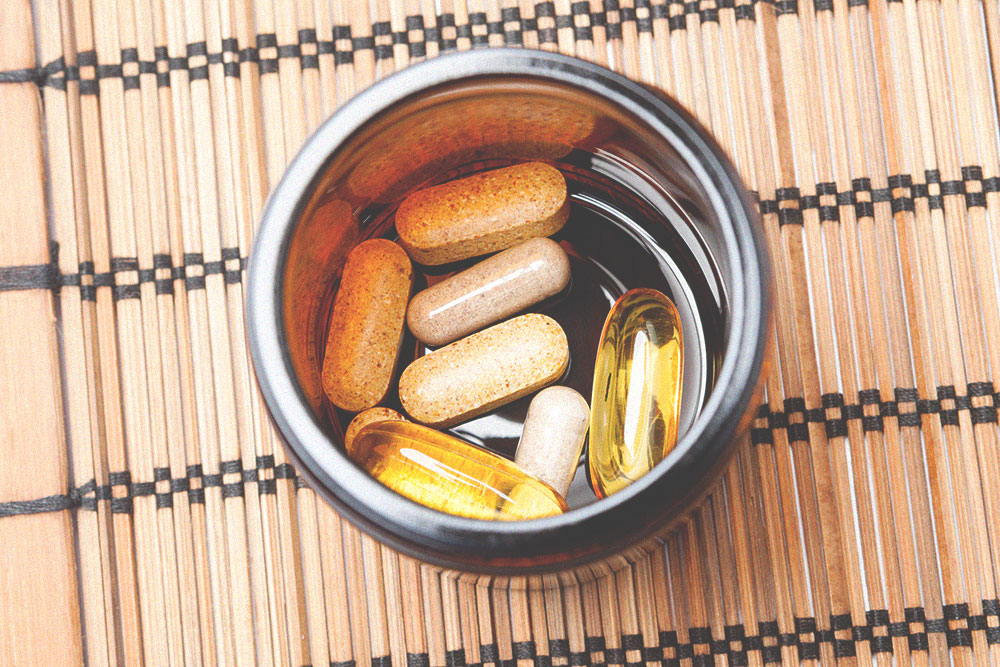Do those super vitamin concoctions safeguard us from ailments and keep us healthy? Let’s learn the truth about multivitamin supplements.
BY: MASCHA DAVIS, MPH, RDN
In the last few decades, multivitamin supplements have become the norm as an ‘insurance’ safeguard for those who may not be getting enough nutrients from food in their diet. More recently, this practice has ballooned into the dietary supplement industry which promotes the idea that people can simply pop a pill, rely on a drink concoction or take a powdered substance to get everything they need.
But what’s the truth about consuming large amounts of vitamins and nutrients all at once?
First, let’s ask the question: do you really need to supplement at all?
Typically, supplements only help if you’re deficient in that nutrient to begin with. But how do you tell if you may be deficient and require supplementation?
Meeting with a health professional, such as your physician or a registered dietitian, is a good place to start. Speak to your doctor about checking your vitamin and mineral levels during your next annual exam. They will identify the necessary blood tests you need, and a dietitian can help review your diet to look at areas where you may have key nutrient gaps.
For example, Vitamin D, B12, B6, and iron are some of the most common deficiencies in the U.S. These are simple to check during your routine labs, and can provide some valuable insight into the need for a supplement.
While some large-scale studies suggest benefits in decreased cancer risk in middle-aged to older men, supplements won’t likely make you ‘healthier’ simply by overshooting, especially if you’re getting enough nutrients in your diet. It just doesn’t work that way!
In fact, excess amounts of vitamins and minerals can sometimes cause more harm than good in your body.
For example, consuming too much Vitamin A can cause it to build up and damage your liver and other tissues. Another nutrient that can cause harm in excess is iron. While iron is critical for good health and prevention of anemia, it is also an oxidant – something that causes cellular damage when there is too much in your body – so it’s really important to only take it when you truly need it.
It’s also interesting to note that other large-scale studies indicate multivitamins have either little or no impact on disease risks such as cardiovascular disease. Some research even suggests that supplementation can potentially increase risk of disease, such as prostate, lung, and breast cancer.
However, what is important to remember is that the majority of studies have shown how dietary patterns from the food we eat (not the supplements we take) have a huge impact on lowering risk of disease. High intake of fruits, vegetables, and whole grains through a varied, balanced diet is the common consensus to a healthy lifestyle.
Another phenomenon to consider is the nutrient-nutrient interactions that can affect absorption.
Taking supplements when they aren’t really necessary can be a waste of money at best, and harmful to your health at worst. At high levels (which is quite common across most supplements), negative interactions can occur between nutrients that lead to less-than-optimal absorption environments.
For example, copper, zinc and iron are chemically similar. When present together in excess, such as in supplements, this can lead to lower absorption of copper and zinc. This is because the receptors that bind these minerals have a ‘preference’ for iron and minimizes the absorption of the other minerals. Interestingly, this has not been found to be the case with dietary iron obtained from food as opposed to supplements. Whole foods contain a complex array of vitamins, minerals and phytonutrients that all work in synergy in our bodies. Simply consuming an isolated vitamin or mineral may mean that you are not getting all the other synergistic factors in whole foods that enhance bioavailability and function.
However, there are appropriate times when supplements are helpful.
While most people are able to get everything they need from a colorful, varied (and delicious!) diet, there are specific situations when extra nutrients through supplementation are recommended.
For example, the CDC recommends that women increase their intake of certain nutrients through supplementation before and during pregnancy. Those who have experienced a severe illness or surgery may require replenishment of depleted nutrient stores through supplementation. People with strict vegan diets or food allergies may also need additional supplementation to fill specific nutrient gaps.
For most healthy people, the best way to meet all of your needs is by eating them in whole foods. Eat a wide variety of unprocessed foods, and you will get not only the essential vitamins and minerals, but also many other compounds like phytonutrients and antioxidants that are extremely beneficial.
Nature’s multivitamins are more delicious, anyway!
For reputable information about supplements, take a look at the Office of Dietary Supplements, which is run by the National Institutes of Health and has up to date information and research on supplements.
Mascha Davis, MPH, RDN is a Los Angeles-based private practice dietitian who shares her love of health and wellness through a unique global perspective. From world-class U.S. medical centers to rural villages in Africa, Mascha has dedicated herself to traveling the world, spreading her love of healthy living through both her humanitarian work and private practice. Learn more about Mascha at Nomadista Nutrition.

